Analysis of Unilever's Management and Operational Strategies Report
VerifiedAdded on 2021/01/02
|17
|5171
|371
Report
AI Summary
This report provides a comprehensive analysis of Unilever's management and operational strategies. It begins with an introduction to management and operations, followed by an overview of Unilever as a company, including its organizational structure and product offerings. The report then delves into the roles of managers and leaders within Unilever, differentiating between their responsibilities and comparing their characteristics. It explores various management and leadership approaches, such as scientific management and behavioral theory, evaluating their strengths and weaknesses in the context of Unilever. The report also examines the functions of a manager, including planning, organizing, coordinating, controlling, and directing. Furthermore, it discusses the impact of the external business environment on managerial decision-making and explores strategies to improve operational efficiencies. The report concludes with recommendations for future improvements, emphasizing the importance of effective leadership and management in achieving organizational goals. The analysis highlights how different management and leadership styles affect the company's operations and overall success, providing insights into how Unilever can optimize its strategies and achieve its objectives.
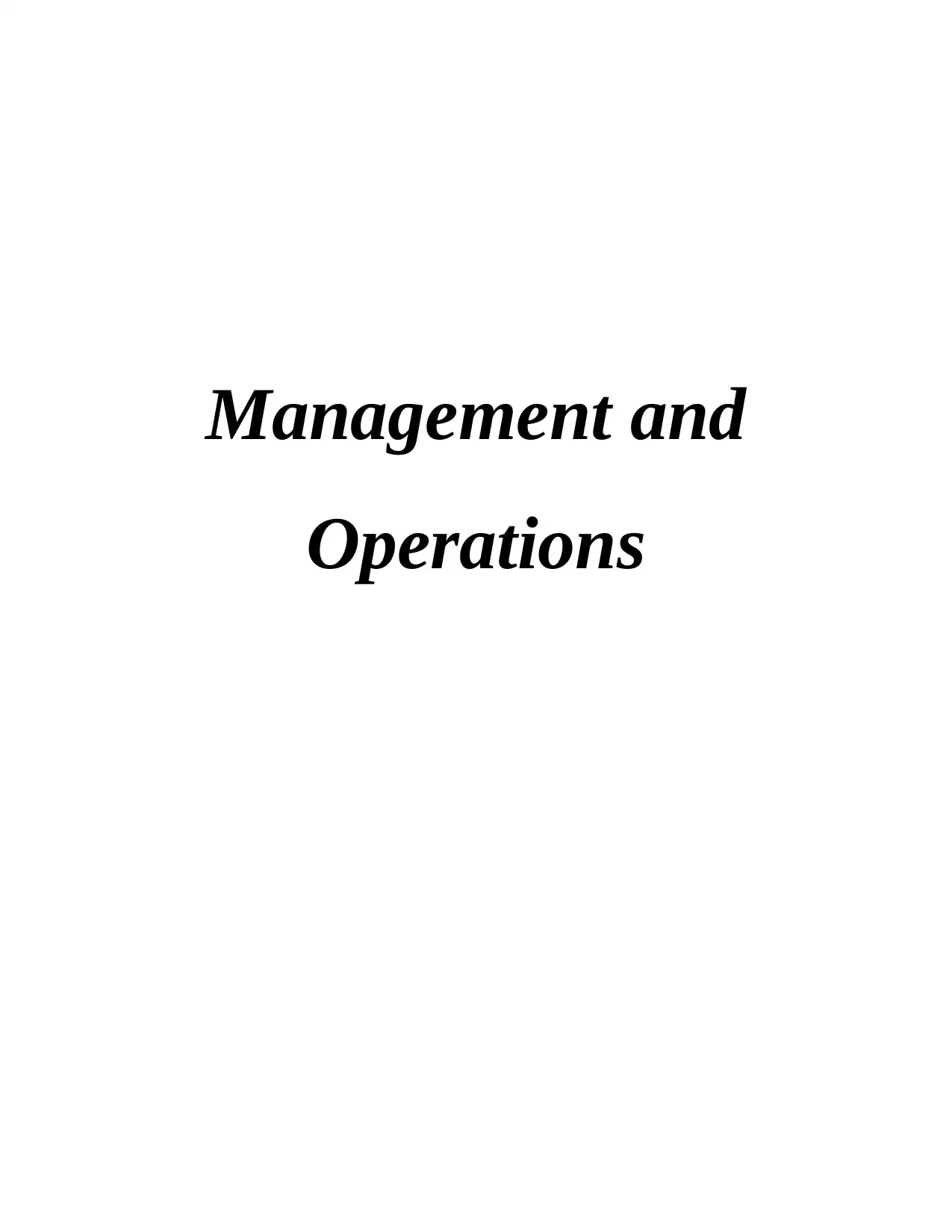
Management and
Operations
Operations
Paraphrase This Document
Need a fresh take? Get an instant paraphrase of this document with our AI Paraphraser

Table of Contents
INTRODUCTION...........................................................................................................................1
TASK 1............................................................................................................................................1
P1............................................................................................................................................1
TASK 2............................................................................................................................................4
P2............................................................................................................................................4
P3............................................................................................................................................7
TASK 3............................................................................................................................................9
P4............................................................................................................................................9
P5..........................................................................................................................................10
TASK 4..........................................................................................................................................11
P6..........................................................................................................................................11
CONCLUSION..............................................................................................................................13
REFERENCES..............................................................................................................................14
INTRODUCTION...........................................................................................................................1
TASK 1............................................................................................................................................1
P1............................................................................................................................................1
TASK 2............................................................................................................................................4
P2............................................................................................................................................4
P3............................................................................................................................................7
TASK 3............................................................................................................................................9
P4............................................................................................................................................9
P5..........................................................................................................................................10
TASK 4..........................................................................................................................................11
P6..........................................................................................................................................11
CONCLUSION..............................................................................................................................13
REFERENCES..............................................................................................................................14
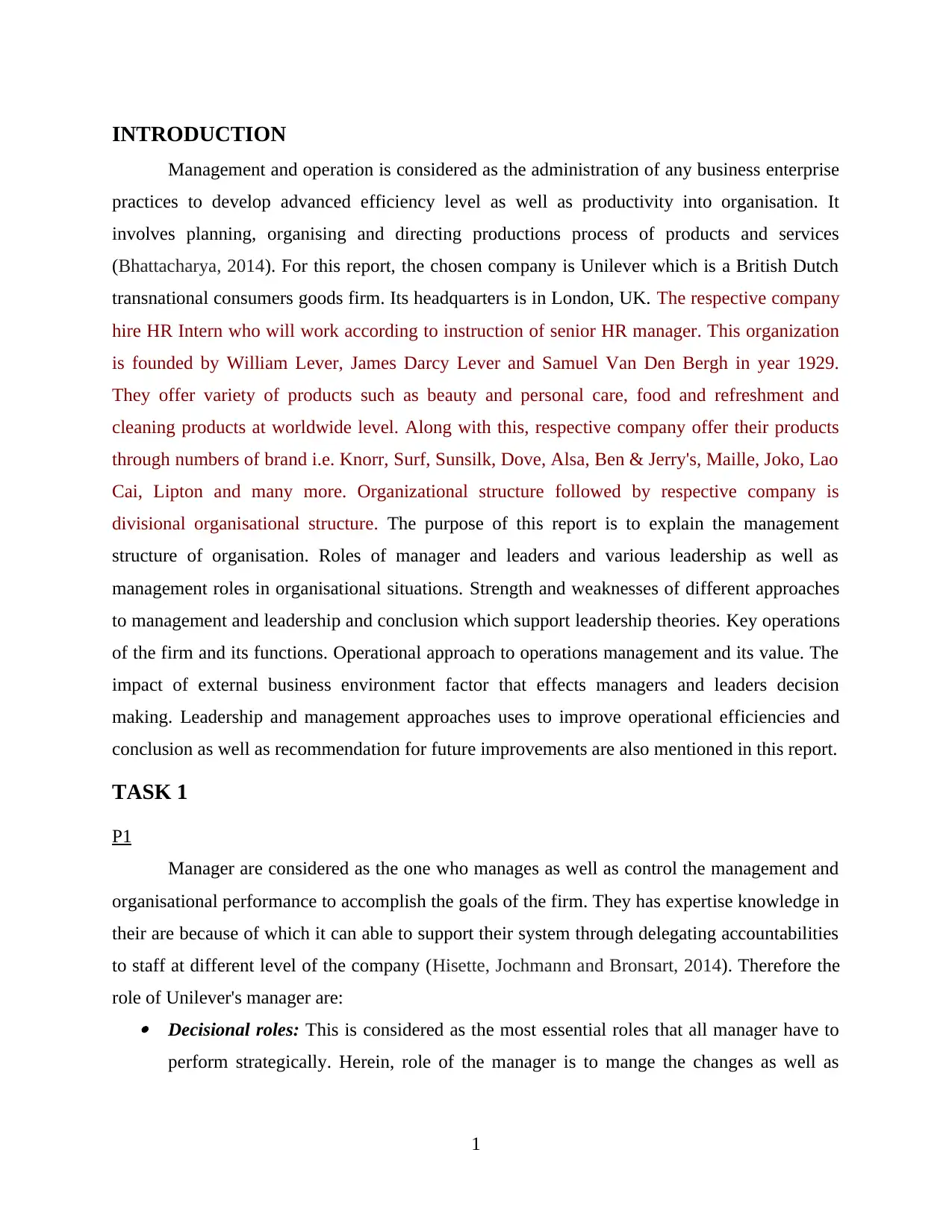
INTRODUCTION
Management and operation is considered as the administration of any business enterprise
practices to develop advanced efficiency level as well as productivity into organisation. It
involves planning, organising and directing productions process of products and services
(Bhattacharya, 2014). For this report, the chosen company is Unilever which is a British Dutch
transnational consumers goods firm. Its headquarters is in London, UK. The respective company
hire HR Intern who will work according to instruction of senior HR manager. This organization
is founded by William Lever, James Darcy Lever and Samuel Van Den Bergh in year 1929.
They offer variety of products such as beauty and personal care, food and refreshment and
cleaning products at worldwide level. Along with this, respective company offer their products
through numbers of brand i.e. Knorr, Surf, Sunsilk, Dove, Alsa, Ben & Jerry's, Maille, Joko, Lao
Cai, Lipton and many more. Organizational structure followed by respective company is
divisional organisational structure. The purpose of this report is to explain the management
structure of organisation. Roles of manager and leaders and various leadership as well as
management roles in organisational situations. Strength and weaknesses of different approaches
to management and leadership and conclusion which support leadership theories. Key operations
of the firm and its functions. Operational approach to operations management and its value. The
impact of external business environment factor that effects managers and leaders decision
making. Leadership and management approaches uses to improve operational efficiencies and
conclusion as well as recommendation for future improvements are also mentioned in this report.
TASK 1
P1
Manager are considered as the one who manages as well as control the management and
organisational performance to accomplish the goals of the firm. They has expertise knowledge in
their are because of which it can able to support their system through delegating accountabilities
to staff at different level of the company (Hisette, Jochmann and Bronsart, 2014). Therefore the
role of Unilever's manager are: Decisional roles: This is considered as the most essential roles that all manager have to
perform strategically. Herein, role of the manager is to mange the changes as well as
1
Management and operation is considered as the administration of any business enterprise
practices to develop advanced efficiency level as well as productivity into organisation. It
involves planning, organising and directing productions process of products and services
(Bhattacharya, 2014). For this report, the chosen company is Unilever which is a British Dutch
transnational consumers goods firm. Its headquarters is in London, UK. The respective company
hire HR Intern who will work according to instruction of senior HR manager. This organization
is founded by William Lever, James Darcy Lever and Samuel Van Den Bergh in year 1929.
They offer variety of products such as beauty and personal care, food and refreshment and
cleaning products at worldwide level. Along with this, respective company offer their products
through numbers of brand i.e. Knorr, Surf, Sunsilk, Dove, Alsa, Ben & Jerry's, Maille, Joko, Lao
Cai, Lipton and many more. Organizational structure followed by respective company is
divisional organisational structure. The purpose of this report is to explain the management
structure of organisation. Roles of manager and leaders and various leadership as well as
management roles in organisational situations. Strength and weaknesses of different approaches
to management and leadership and conclusion which support leadership theories. Key operations
of the firm and its functions. Operational approach to operations management and its value. The
impact of external business environment factor that effects managers and leaders decision
making. Leadership and management approaches uses to improve operational efficiencies and
conclusion as well as recommendation for future improvements are also mentioned in this report.
TASK 1
P1
Manager are considered as the one who manages as well as control the management and
organisational performance to accomplish the goals of the firm. They has expertise knowledge in
their are because of which it can able to support their system through delegating accountabilities
to staff at different level of the company (Hisette, Jochmann and Bronsart, 2014). Therefore the
role of Unilever's manager are: Decisional roles: This is considered as the most essential roles that all manager have to
perform strategically. Herein, role of the manager is to mange the changes as well as
1
⊘ This is a preview!⊘
Do you want full access?
Subscribe today to unlock all pages.

Trusted by 1+ million students worldwide
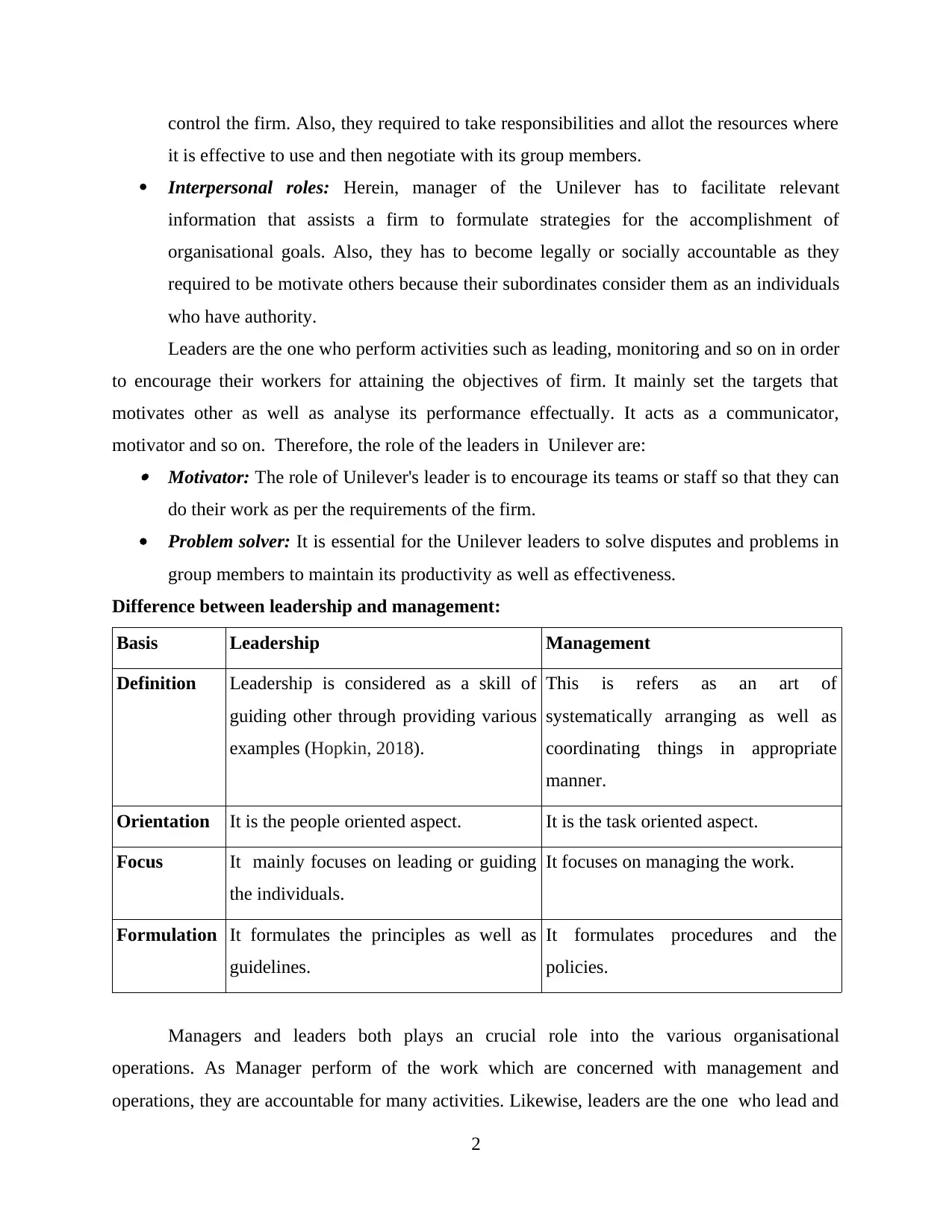
control the firm. Also, they required to take responsibilities and allot the resources where
it is effective to use and then negotiate with its group members.
Interpersonal roles: Herein, manager of the Unilever has to facilitate relevant
information that assists a firm to formulate strategies for the accomplishment of
organisational goals. Also, they has to become legally or socially accountable as they
required to be motivate others because their subordinates consider them as an individuals
who have authority.
Leaders are the one who perform activities such as leading, monitoring and so on in order
to encourage their workers for attaining the objectives of firm. It mainly set the targets that
motivates other as well as analyse its performance effectually. It acts as a communicator,
motivator and so on. Therefore, the role of the leaders in Unilever are: Motivator: The role of Unilever's leader is to encourage its teams or staff so that they can
do their work as per the requirements of the firm.
Problem solver: It is essential for the Unilever leaders to solve disputes and problems in
group members to maintain its productivity as well as effectiveness.
Difference between leadership and management:
Basis Leadership Management
Definition Leadership is considered as a skill of
guiding other through providing various
examples (Hopkin, 2018).
This is refers as an art of
systematically arranging as well as
coordinating things in appropriate
manner.
Orientation It is the people oriented aspect. It is the task oriented aspect.
Focus It mainly focuses on leading or guiding
the individuals.
It focuses on managing the work.
Formulation It formulates the principles as well as
guidelines.
It formulates procedures and the
policies.
Managers and leaders both plays an crucial role into the various organisational
operations. As Manager perform of the work which are concerned with management and
operations, they are accountable for many activities. Likewise, leaders are the one who lead and
2
it is effective to use and then negotiate with its group members.
Interpersonal roles: Herein, manager of the Unilever has to facilitate relevant
information that assists a firm to formulate strategies for the accomplishment of
organisational goals. Also, they has to become legally or socially accountable as they
required to be motivate others because their subordinates consider them as an individuals
who have authority.
Leaders are the one who perform activities such as leading, monitoring and so on in order
to encourage their workers for attaining the objectives of firm. It mainly set the targets that
motivates other as well as analyse its performance effectually. It acts as a communicator,
motivator and so on. Therefore, the role of the leaders in Unilever are: Motivator: The role of Unilever's leader is to encourage its teams or staff so that they can
do their work as per the requirements of the firm.
Problem solver: It is essential for the Unilever leaders to solve disputes and problems in
group members to maintain its productivity as well as effectiveness.
Difference between leadership and management:
Basis Leadership Management
Definition Leadership is considered as a skill of
guiding other through providing various
examples (Hopkin, 2018).
This is refers as an art of
systematically arranging as well as
coordinating things in appropriate
manner.
Orientation It is the people oriented aspect. It is the task oriented aspect.
Focus It mainly focuses on leading or guiding
the individuals.
It focuses on managing the work.
Formulation It formulates the principles as well as
guidelines.
It formulates procedures and the
policies.
Managers and leaders both plays an crucial role into the various organisational
operations. As Manager perform of the work which are concerned with management and
operations, they are accountable for many activities. Likewise, leaders are the one who lead and
2
Paraphrase This Document
Need a fresh take? Get an instant paraphrase of this document with our AI Paraphraser
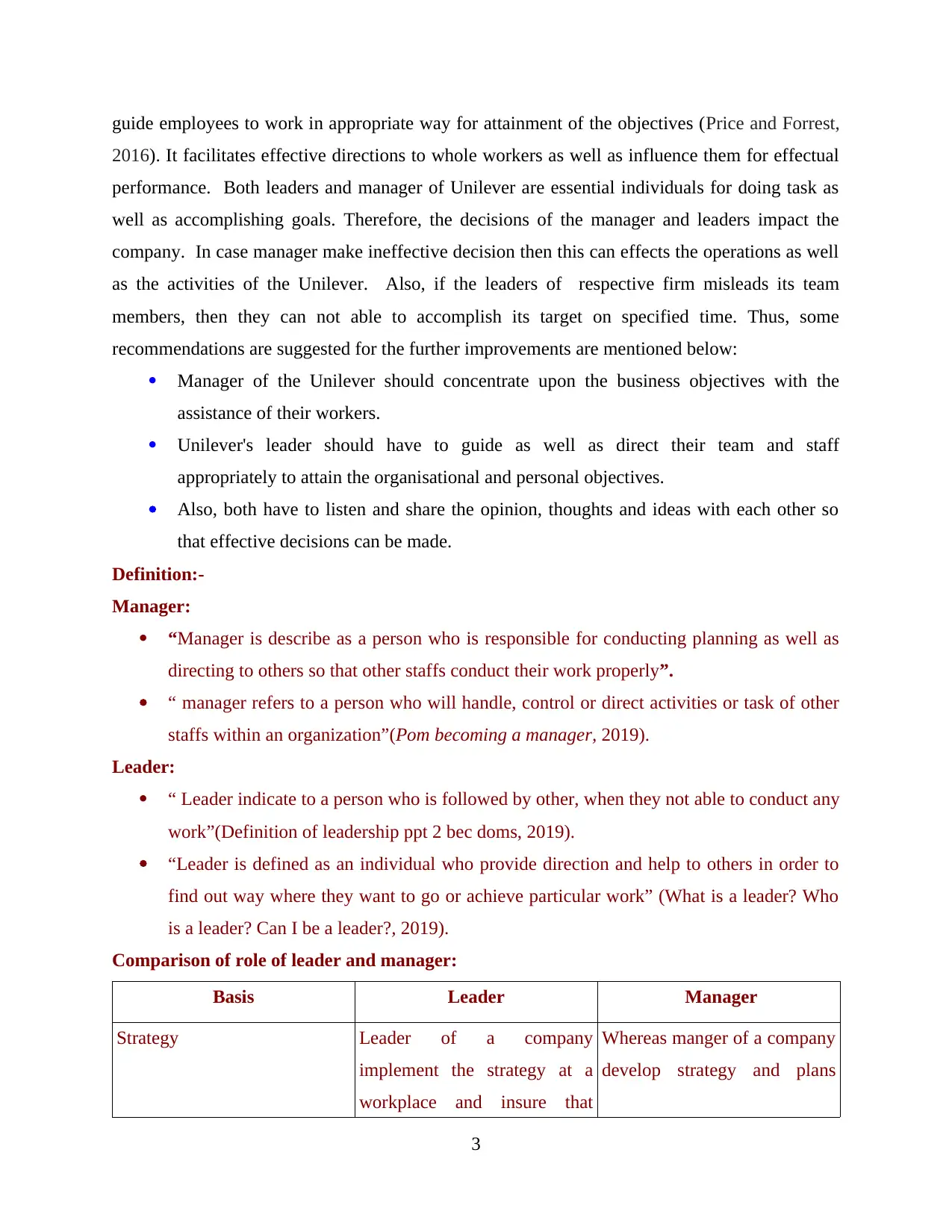
guide employees to work in appropriate way for attainment of the objectives (Price and Forrest,
2016). It facilitates effective directions to whole workers as well as influence them for effectual
performance. Both leaders and manager of Unilever are essential individuals for doing task as
well as accomplishing goals. Therefore, the decisions of the manager and leaders impact the
company. In case manager make ineffective decision then this can effects the operations as well
as the activities of the Unilever. Also, if the leaders of respective firm misleads its team
members, then they can not able to accomplish its target on specified time. Thus, some
recommendations are suggested for the further improvements are mentioned below:
Manager of the Unilever should concentrate upon the business objectives with the
assistance of their workers.
Unilever's leader should have to guide as well as direct their team and staff
appropriately to attain the organisational and personal objectives.
Also, both have to listen and share the opinion, thoughts and ideas with each other so
that effective decisions can be made.
Definition:-
Manager:
“Manager is describe as a person who is responsible for conducting planning as well as
directing to others so that other staffs conduct their work properly”.
“ manager refers to a person who will handle, control or direct activities or task of other
staffs within an organization”(Pom becoming a manager, 2019).
Leader:
“ Leader indicate to a person who is followed by other, when they not able to conduct any
work”(Definition of leadership ppt 2 bec doms, 2019).
“Leader is defined as an individual who provide direction and help to others in order to
find out way where they want to go or achieve particular work” (What is a leader? Who
is a leader? Can I be a leader?, 2019).
Comparison of role of leader and manager:
Basis Leader Manager
Strategy Leader of a company
implement the strategy at a
workplace and insure that
Whereas manger of a company
develop strategy and plans
3
2016). It facilitates effective directions to whole workers as well as influence them for effectual
performance. Both leaders and manager of Unilever are essential individuals for doing task as
well as accomplishing goals. Therefore, the decisions of the manager and leaders impact the
company. In case manager make ineffective decision then this can effects the operations as well
as the activities of the Unilever. Also, if the leaders of respective firm misleads its team
members, then they can not able to accomplish its target on specified time. Thus, some
recommendations are suggested for the further improvements are mentioned below:
Manager of the Unilever should concentrate upon the business objectives with the
assistance of their workers.
Unilever's leader should have to guide as well as direct their team and staff
appropriately to attain the organisational and personal objectives.
Also, both have to listen and share the opinion, thoughts and ideas with each other so
that effective decisions can be made.
Definition:-
Manager:
“Manager is describe as a person who is responsible for conducting planning as well as
directing to others so that other staffs conduct their work properly”.
“ manager refers to a person who will handle, control or direct activities or task of other
staffs within an organization”(Pom becoming a manager, 2019).
Leader:
“ Leader indicate to a person who is followed by other, when they not able to conduct any
work”(Definition of leadership ppt 2 bec doms, 2019).
“Leader is defined as an individual who provide direction and help to others in order to
find out way where they want to go or achieve particular work” (What is a leader? Who
is a leader? Can I be a leader?, 2019).
Comparison of role of leader and manager:
Basis Leader Manager
Strategy Leader of a company
implement the strategy at a
workplace and insure that
Whereas manger of a company
develop strategy and plans
3

work is conducted in effective
manner.
according to requirement.
Comparison of characteristics leader and manger:
Basis Leader Manager
Credit The leader of a company give
credit to their employees when
they conduct their work.
Whereas manage of a
company take credit when any
work is conducted effectively.
Characteristics of leaders and manager:
Manager:
Manager of the Unilever are imaginative thinker because of which they develop effectual
decision as well as policies through benefiting both staff and management.
Unilever's manager are committed towards the organisational success because of which
they control the respective firm operations
Leaders:
Unilever's ability is to lead the team in for attaining the objective of the company.
They has the characteristics of problem solving because of which they create a strong
bonds with its followers in order to face difficult situation significantly.
Conclusion:
Characteristics of leaders as well as the manager are different from one another as
managers of the Unilever are imaginative thinker, committer towards work and many more.
Where as leaders are problem solver, leading team etc.
TASK 2
P2
The roles of management and leadership helps in achieving desired goals and objectives.
It also helps in deal with various kinds of situations in case of Unilever which is an multinational
organisation so there are cultural diversity in organisation. Due to cultural diversity, various
kinds of disputes arise in organisation. In that case, role of manager and leader arises.
Management as well as leadership both are crucial for the company. Both assists firm to
accomplish the set targets (Pheng and Meng, 2018). They have various approaches such as
4
manner.
according to requirement.
Comparison of characteristics leader and manger:
Basis Leader Manager
Credit The leader of a company give
credit to their employees when
they conduct their work.
Whereas manage of a
company take credit when any
work is conducted effectively.
Characteristics of leaders and manager:
Manager:
Manager of the Unilever are imaginative thinker because of which they develop effectual
decision as well as policies through benefiting both staff and management.
Unilever's manager are committed towards the organisational success because of which
they control the respective firm operations
Leaders:
Unilever's ability is to lead the team in for attaining the objective of the company.
They has the characteristics of problem solving because of which they create a strong
bonds with its followers in order to face difficult situation significantly.
Conclusion:
Characteristics of leaders as well as the manager are different from one another as
managers of the Unilever are imaginative thinker, committer towards work and many more.
Where as leaders are problem solver, leading team etc.
TASK 2
P2
The roles of management and leadership helps in achieving desired goals and objectives.
It also helps in deal with various kinds of situations in case of Unilever which is an multinational
organisation so there are cultural diversity in organisation. Due to cultural diversity, various
kinds of disputes arise in organisation. In that case, role of manager and leader arises.
Management as well as leadership both are crucial for the company. Both assists firm to
accomplish the set targets (Pheng and Meng, 2018). They have various approaches such as
4
⊘ This is a preview!⊘
Do you want full access?
Subscribe today to unlock all pages.

Trusted by 1+ million students worldwide
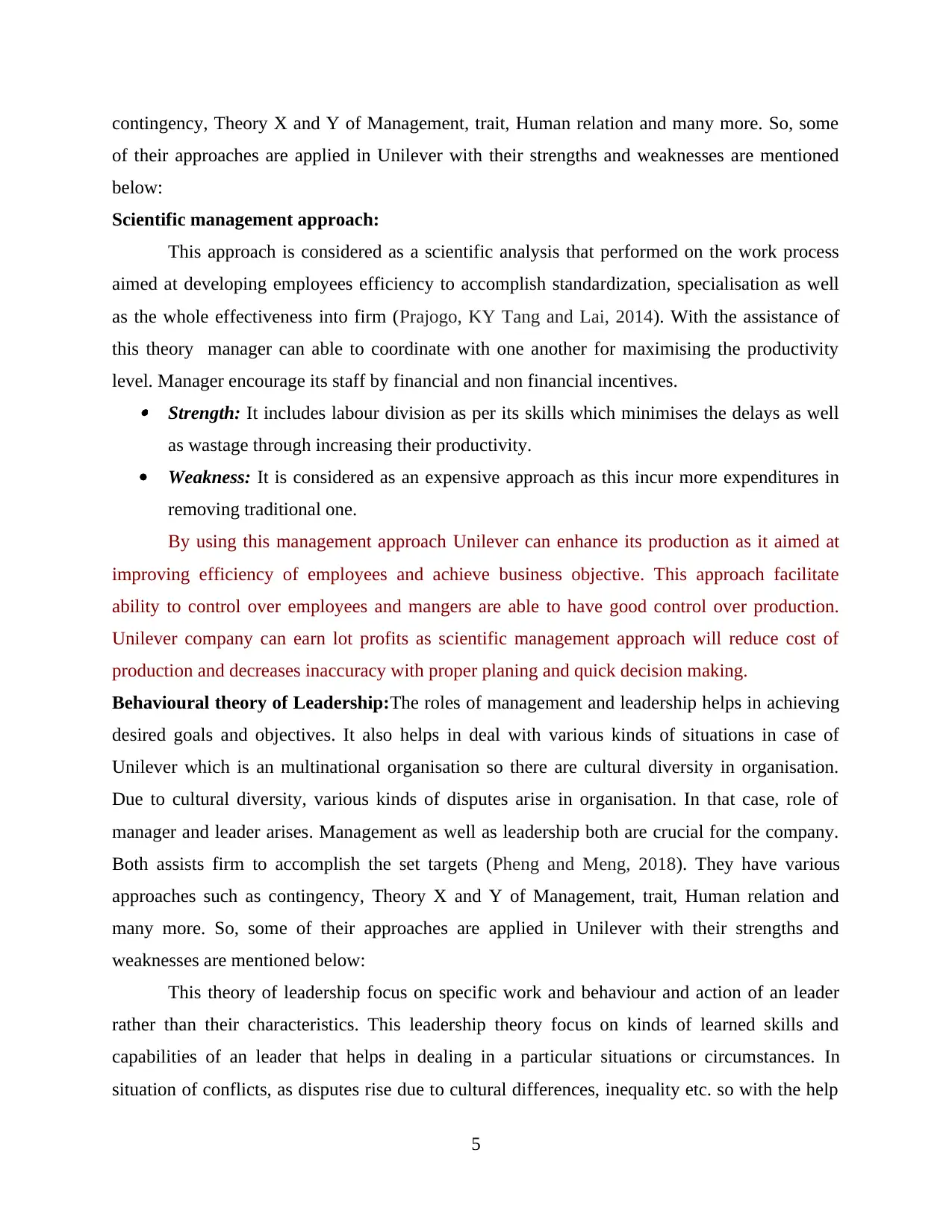
contingency, Theory X and Y of Management, trait, Human relation and many more. So, some
of their approaches are applied in Unilever with their strengths and weaknesses are mentioned
below:
Scientific management approach:
This approach is considered as a scientific analysis that performed on the work process
aimed at developing employees efficiency to accomplish standardization, specialisation as well
as the whole effectiveness into firm (Prajogo, KY Tang and Lai, 2014). With the assistance of
this theory manager can able to coordinate with one another for maximising the productivity
level. Manager encourage its staff by financial and non financial incentives. Strength: It includes labour division as per its skills which minimises the delays as well
as wastage through increasing their productivity.
Weakness: It is considered as an expensive approach as this incur more expenditures in
removing traditional one.
By using this management approach Unilever can enhance its production as it aimed at
improving efficiency of employees and achieve business objective. This approach facilitate
ability to control over employees and mangers are able to have good control over production.
Unilever company can earn lot profits as scientific management approach will reduce cost of
production and decreases inaccuracy with proper planing and quick decision making.
Behavioural theory of Leadership:The roles of management and leadership helps in achieving
desired goals and objectives. It also helps in deal with various kinds of situations in case of
Unilever which is an multinational organisation so there are cultural diversity in organisation.
Due to cultural diversity, various kinds of disputes arise in organisation. In that case, role of
manager and leader arises. Management as well as leadership both are crucial for the company.
Both assists firm to accomplish the set targets (Pheng and Meng, 2018). They have various
approaches such as contingency, Theory X and Y of Management, trait, Human relation and
many more. So, some of their approaches are applied in Unilever with their strengths and
weaknesses are mentioned below:
This theory of leadership focus on specific work and behaviour and action of an leader
rather than their characteristics. This leadership theory focus on kinds of learned skills and
capabilities of an leader that helps in dealing in a particular situations or circumstances. In
situation of conflicts, as disputes rise due to cultural differences, inequality etc. so with the help
5
of their approaches are applied in Unilever with their strengths and weaknesses are mentioned
below:
Scientific management approach:
This approach is considered as a scientific analysis that performed on the work process
aimed at developing employees efficiency to accomplish standardization, specialisation as well
as the whole effectiveness into firm (Prajogo, KY Tang and Lai, 2014). With the assistance of
this theory manager can able to coordinate with one another for maximising the productivity
level. Manager encourage its staff by financial and non financial incentives. Strength: It includes labour division as per its skills which minimises the delays as well
as wastage through increasing their productivity.
Weakness: It is considered as an expensive approach as this incur more expenditures in
removing traditional one.
By using this management approach Unilever can enhance its production as it aimed at
improving efficiency of employees and achieve business objective. This approach facilitate
ability to control over employees and mangers are able to have good control over production.
Unilever company can earn lot profits as scientific management approach will reduce cost of
production and decreases inaccuracy with proper planing and quick decision making.
Behavioural theory of Leadership:The roles of management and leadership helps in achieving
desired goals and objectives. It also helps in deal with various kinds of situations in case of
Unilever which is an multinational organisation so there are cultural diversity in organisation.
Due to cultural diversity, various kinds of disputes arise in organisation. In that case, role of
manager and leader arises. Management as well as leadership both are crucial for the company.
Both assists firm to accomplish the set targets (Pheng and Meng, 2018). They have various
approaches such as contingency, Theory X and Y of Management, trait, Human relation and
many more. So, some of their approaches are applied in Unilever with their strengths and
weaknesses are mentioned below:
This theory of leadership focus on specific work and behaviour and action of an leader
rather than their characteristics. This leadership theory focus on kinds of learned skills and
capabilities of an leader that helps in dealing in a particular situations or circumstances. In
situation of conflicts, as disputes rise due to cultural differences, inequality etc. so with the help
5
Paraphrase This Document
Need a fresh take? Get an instant paraphrase of this document with our AI Paraphraser
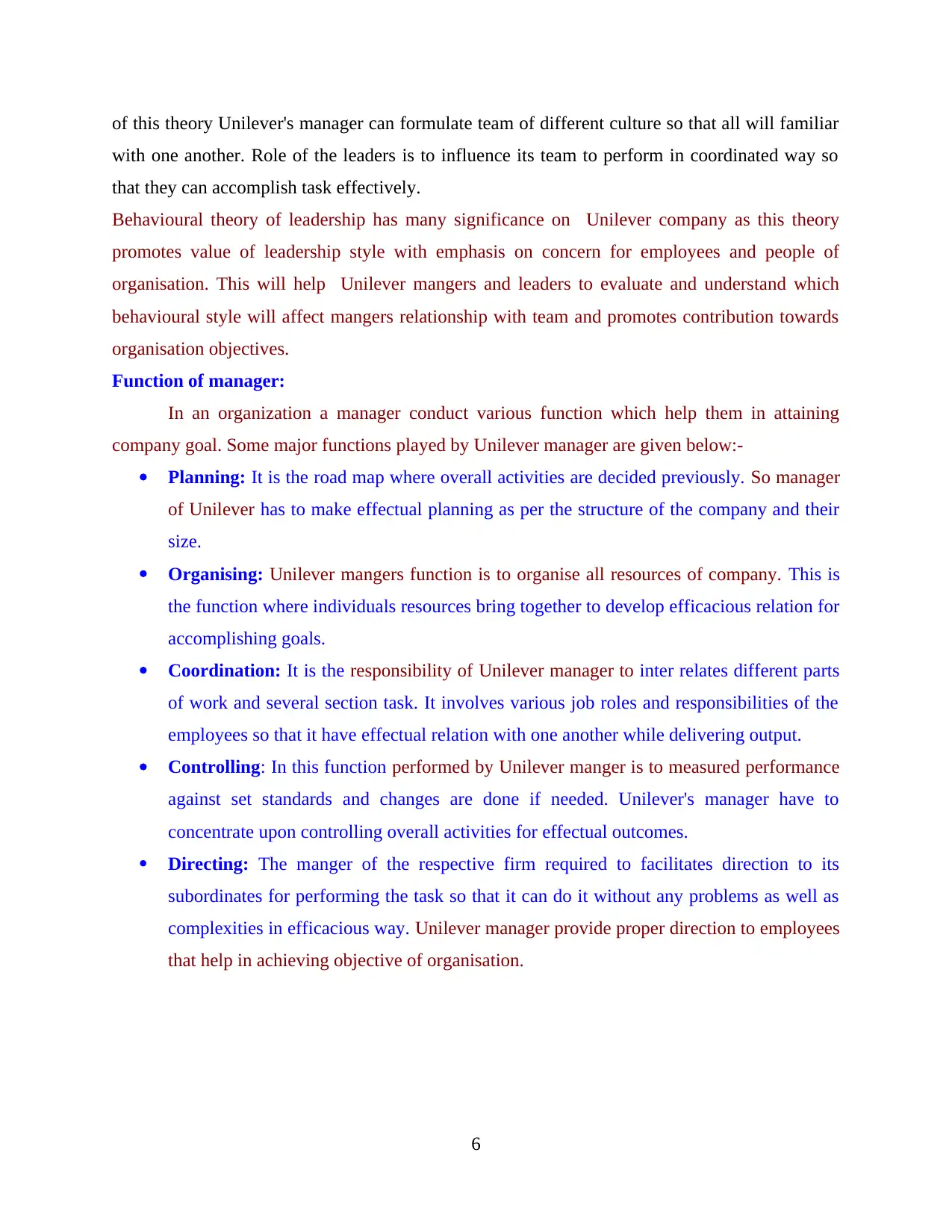
of this theory Unilever's manager can formulate team of different culture so that all will familiar
with one another. Role of the leaders is to influence its team to perform in coordinated way so
that they can accomplish task effectively.
Behavioural theory of leadership has many significance on Unilever company as this theory
promotes value of leadership style with emphasis on concern for employees and people of
organisation. This will help Unilever mangers and leaders to evaluate and understand which
behavioural style will affect mangers relationship with team and promotes contribution towards
organisation objectives.
Function of manager:
In an organization a manager conduct various function which help them in attaining
company goal. Some major functions played by Unilever manager are given below:-
Planning: It is the road map where overall activities are decided previously. So manager
of Unilever has to make effectual planning as per the structure of the company and their
size.
Organising: Unilever mangers function is to organise all resources of company. This is
the function where individuals resources bring together to develop efficacious relation for
accomplishing goals.
Coordination: It is the responsibility of Unilever manager to inter relates different parts
of work and several section task. It involves various job roles and responsibilities of the
employees so that it have effectual relation with one another while delivering output.
Controlling: In this function performed by Unilever manger is to measured performance
against set standards and changes are done if needed. Unilever's manager have to
concentrate upon controlling overall activities for effectual outcomes.
Directing: The manger of the respective firm required to facilitates direction to its
subordinates for performing the task so that it can do it without any problems as well as
complexities in efficacious way. Unilever manager provide proper direction to employees
that help in achieving objective of organisation.
6
with one another. Role of the leaders is to influence its team to perform in coordinated way so
that they can accomplish task effectively.
Behavioural theory of leadership has many significance on Unilever company as this theory
promotes value of leadership style with emphasis on concern for employees and people of
organisation. This will help Unilever mangers and leaders to evaluate and understand which
behavioural style will affect mangers relationship with team and promotes contribution towards
organisation objectives.
Function of manager:
In an organization a manager conduct various function which help them in attaining
company goal. Some major functions played by Unilever manager are given below:-
Planning: It is the road map where overall activities are decided previously. So manager
of Unilever has to make effectual planning as per the structure of the company and their
size.
Organising: Unilever mangers function is to organise all resources of company. This is
the function where individuals resources bring together to develop efficacious relation for
accomplishing goals.
Coordination: It is the responsibility of Unilever manager to inter relates different parts
of work and several section task. It involves various job roles and responsibilities of the
employees so that it have effectual relation with one another while delivering output.
Controlling: In this function performed by Unilever manger is to measured performance
against set standards and changes are done if needed. Unilever's manager have to
concentrate upon controlling overall activities for effectual outcomes.
Directing: The manger of the respective firm required to facilitates direction to its
subordinates for performing the task so that it can do it without any problems as well as
complexities in efficacious way. Unilever manager provide proper direction to employees
that help in achieving objective of organisation.
6
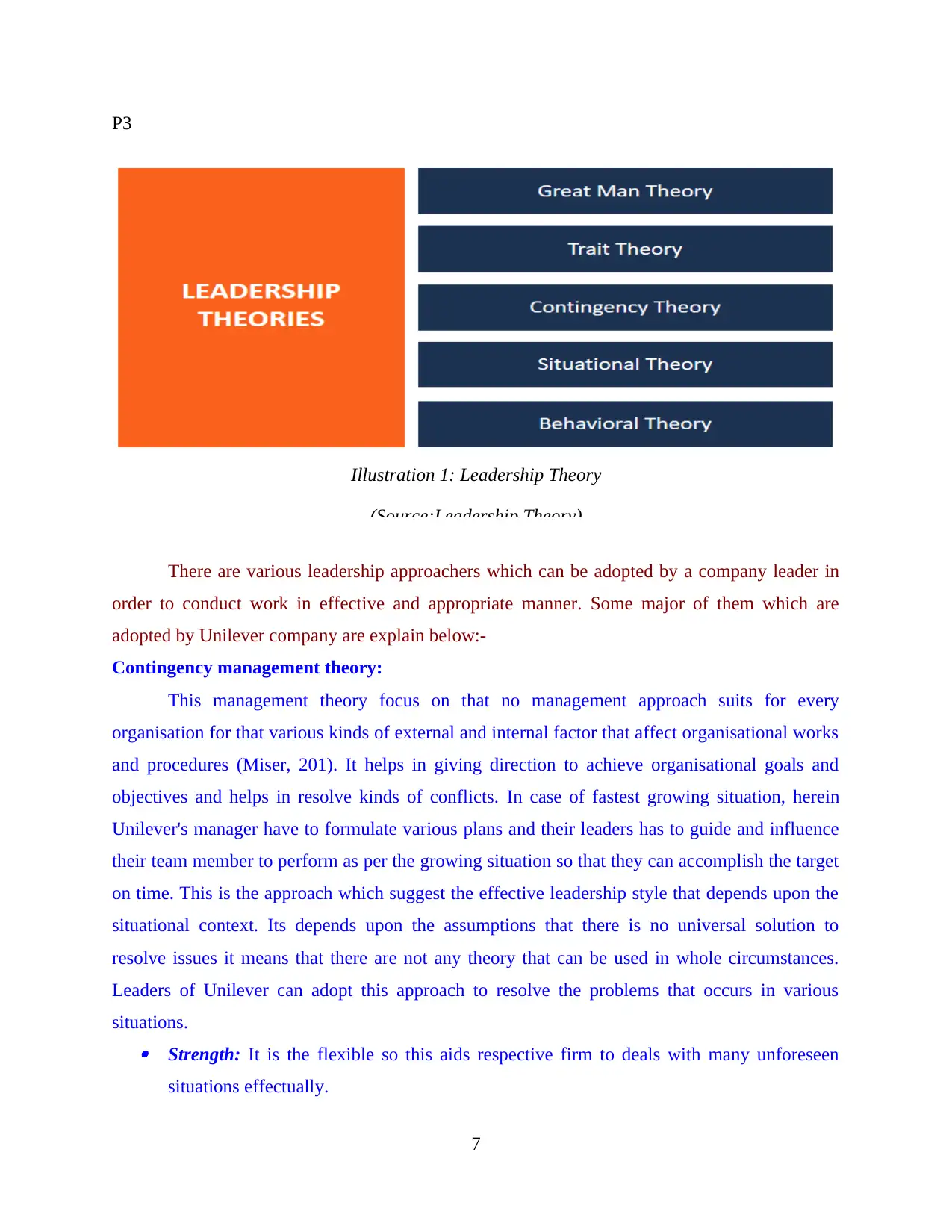
P3
There are various leadership approachers which can be adopted by a company leader in
order to conduct work in effective and appropriate manner. Some major of them which are
adopted by Unilever company are explain below:-
Contingency management theory:
This management theory focus on that no management approach suits for every
organisation for that various kinds of external and internal factor that affect organisational works
and procedures (Miser, 201). It helps in giving direction to achieve organisational goals and
objectives and helps in resolve kinds of conflicts. In case of fastest growing situation, herein
Unilever's manager have to formulate various plans and their leaders has to guide and influence
their team member to perform as per the growing situation so that they can accomplish the target
on time. This is the approach which suggest the effective leadership style that depends upon the
situational context. Its depends upon the assumptions that there is no universal solution to
resolve issues it means that there are not any theory that can be used in whole circumstances.
Leaders of Unilever can adopt this approach to resolve the problems that occurs in various
situations. Strength: It is the flexible so this aids respective firm to deals with many unforeseen
situations effectually.
7
Illustration 1: Leadership Theory
(Source:Leadership Theory)
There are various leadership approachers which can be adopted by a company leader in
order to conduct work in effective and appropriate manner. Some major of them which are
adopted by Unilever company are explain below:-
Contingency management theory:
This management theory focus on that no management approach suits for every
organisation for that various kinds of external and internal factor that affect organisational works
and procedures (Miser, 201). It helps in giving direction to achieve organisational goals and
objectives and helps in resolve kinds of conflicts. In case of fastest growing situation, herein
Unilever's manager have to formulate various plans and their leaders has to guide and influence
their team member to perform as per the growing situation so that they can accomplish the target
on time. This is the approach which suggest the effective leadership style that depends upon the
situational context. Its depends upon the assumptions that there is no universal solution to
resolve issues it means that there are not any theory that can be used in whole circumstances.
Leaders of Unilever can adopt this approach to resolve the problems that occurs in various
situations. Strength: It is the flexible so this aids respective firm to deals with many unforeseen
situations effectually.
7
Illustration 1: Leadership Theory
(Source:Leadership Theory)
⊘ This is a preview!⊘
Do you want full access?
Subscribe today to unlock all pages.

Trusted by 1+ million students worldwide
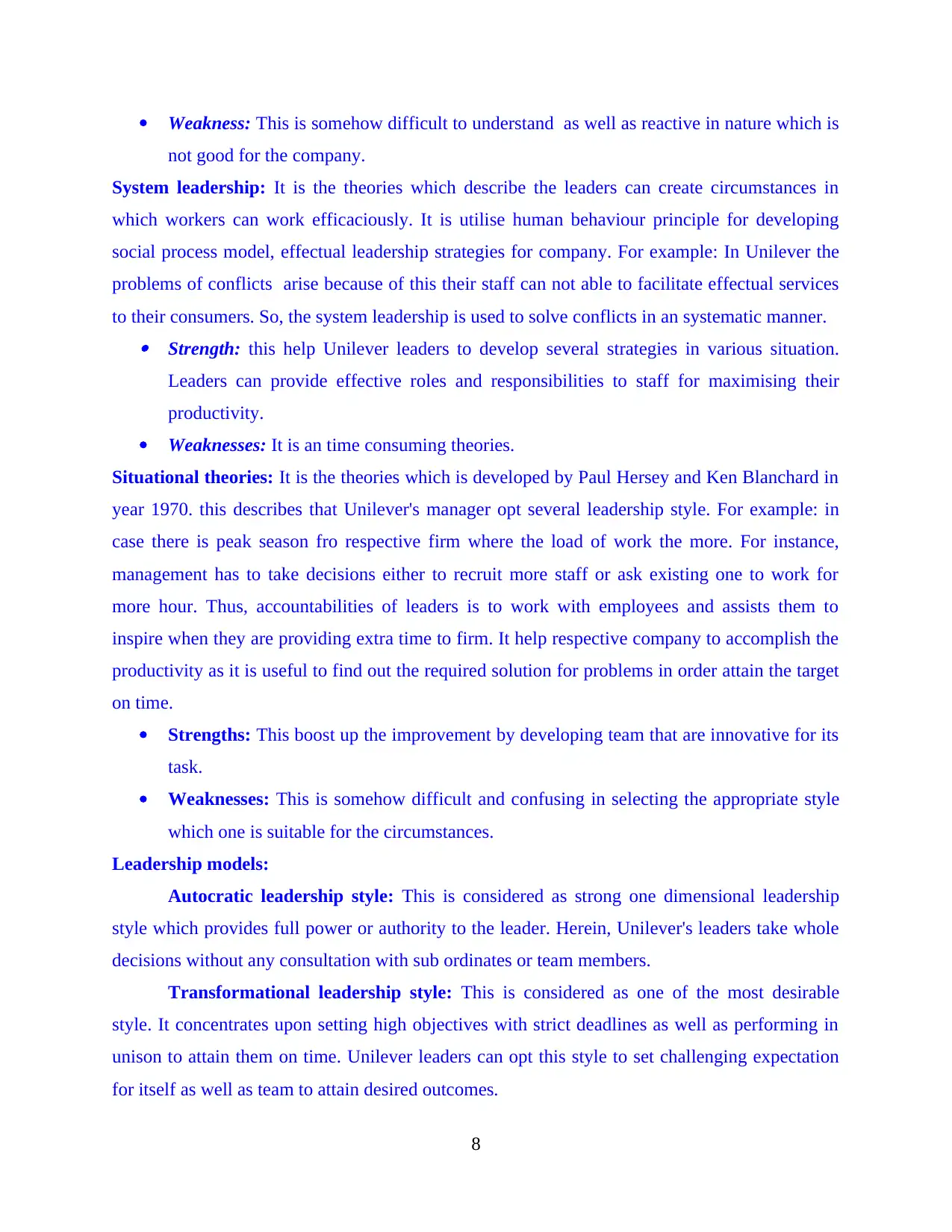
Weakness: This is somehow difficult to understand as well as reactive in nature which is
not good for the company.
System leadership: It is the theories which describe the leaders can create circumstances in
which workers can work efficaciously. It is utilise human behaviour principle for developing
social process model, effectual leadership strategies for company. For example: In Unilever the
problems of conflicts arise because of this their staff can not able to facilitate effectual services
to their consumers. So, the system leadership is used to solve conflicts in an systematic manner. Strength: this help Unilever leaders to develop several strategies in various situation.
Leaders can provide effective roles and responsibilities to staff for maximising their
productivity.
Weaknesses: It is an time consuming theories.
Situational theories: It is the theories which is developed by Paul Hersey and Ken Blanchard in
year 1970. this describes that Unilever's manager opt several leadership style. For example: in
case there is peak season fro respective firm where the load of work the more. For instance,
management has to take decisions either to recruit more staff or ask existing one to work for
more hour. Thus, accountabilities of leaders is to work with employees and assists them to
inspire when they are providing extra time to firm. It help respective company to accomplish the
productivity as it is useful to find out the required solution for problems in order attain the target
on time.
Strengths: This boost up the improvement by developing team that are innovative for its
task.
Weaknesses: This is somehow difficult and confusing in selecting the appropriate style
which one is suitable for the circumstances.
Leadership models:
Autocratic leadership style: This is considered as strong one dimensional leadership
style which provides full power or authority to the leader. Herein, Unilever's leaders take whole
decisions without any consultation with sub ordinates or team members.
Transformational leadership style: This is considered as one of the most desirable
style. It concentrates upon setting high objectives with strict deadlines as well as performing in
unison to attain them on time. Unilever leaders can opt this style to set challenging expectation
for itself as well as team to attain desired outcomes.
8
not good for the company.
System leadership: It is the theories which describe the leaders can create circumstances in
which workers can work efficaciously. It is utilise human behaviour principle for developing
social process model, effectual leadership strategies for company. For example: In Unilever the
problems of conflicts arise because of this their staff can not able to facilitate effectual services
to their consumers. So, the system leadership is used to solve conflicts in an systematic manner. Strength: this help Unilever leaders to develop several strategies in various situation.
Leaders can provide effective roles and responsibilities to staff for maximising their
productivity.
Weaknesses: It is an time consuming theories.
Situational theories: It is the theories which is developed by Paul Hersey and Ken Blanchard in
year 1970. this describes that Unilever's manager opt several leadership style. For example: in
case there is peak season fro respective firm where the load of work the more. For instance,
management has to take decisions either to recruit more staff or ask existing one to work for
more hour. Thus, accountabilities of leaders is to work with employees and assists them to
inspire when they are providing extra time to firm. It help respective company to accomplish the
productivity as it is useful to find out the required solution for problems in order attain the target
on time.
Strengths: This boost up the improvement by developing team that are innovative for its
task.
Weaknesses: This is somehow difficult and confusing in selecting the appropriate style
which one is suitable for the circumstances.
Leadership models:
Autocratic leadership style: This is considered as strong one dimensional leadership
style which provides full power or authority to the leader. Herein, Unilever's leaders take whole
decisions without any consultation with sub ordinates or team members.
Transformational leadership style: This is considered as one of the most desirable
style. It concentrates upon setting high objectives with strict deadlines as well as performing in
unison to attain them on time. Unilever leaders can opt this style to set challenging expectation
for itself as well as team to attain desired outcomes.
8
Paraphrase This Document
Need a fresh take? Get an instant paraphrase of this document with our AI Paraphraser
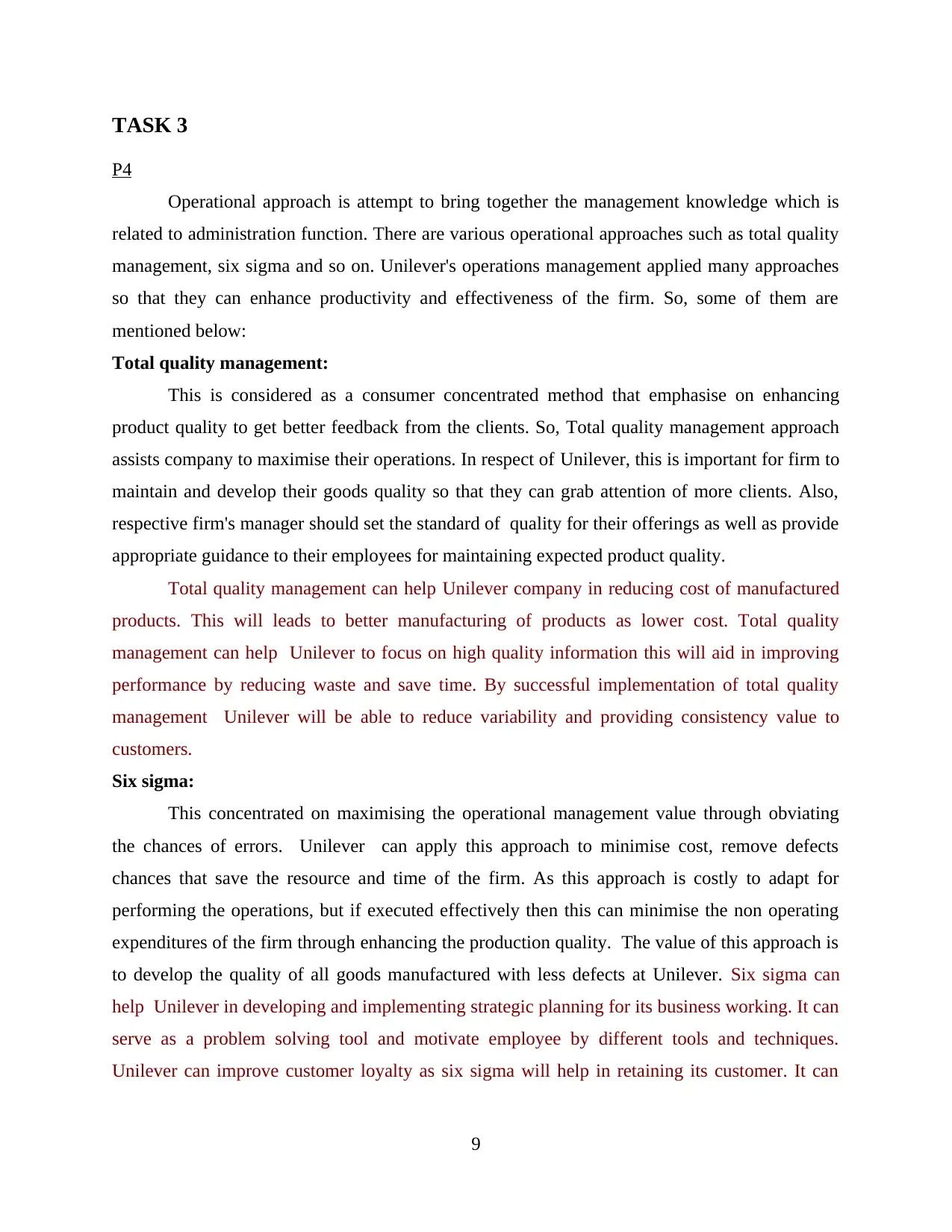
TASK 3
P4
Operational approach is attempt to bring together the management knowledge which is
related to administration function. There are various operational approaches such as total quality
management, six sigma and so on. Unilever's operations management applied many approaches
so that they can enhance productivity and effectiveness of the firm. So, some of them are
mentioned below:
Total quality management:
This is considered as a consumer concentrated method that emphasise on enhancing
product quality to get better feedback from the clients. So, Total quality management approach
assists company to maximise their operations. In respect of Unilever, this is important for firm to
maintain and develop their goods quality so that they can grab attention of more clients. Also,
respective firm's manager should set the standard of quality for their offerings as well as provide
appropriate guidance to their employees for maintaining expected product quality.
Total quality management can help Unilever company in reducing cost of manufactured
products. This will leads to better manufacturing of products as lower cost. Total quality
management can help Unilever to focus on high quality information this will aid in improving
performance by reducing waste and save time. By successful implementation of total quality
management Unilever will be able to reduce variability and providing consistency value to
customers.
Six sigma:
This concentrated on maximising the operational management value through obviating
the chances of errors. Unilever can apply this approach to minimise cost, remove defects
chances that save the resource and time of the firm. As this approach is costly to adapt for
performing the operations, but if executed effectively then this can minimise the non operating
expenditures of the firm through enhancing the production quality. The value of this approach is
to develop the quality of all goods manufactured with less defects at Unilever. Six sigma can
help Unilever in developing and implementing strategic planning for its business working. It can
serve as a problem solving tool and motivate employee by different tools and techniques.
Unilever can improve customer loyalty as six sigma will help in retaining its customer. It can
9
P4
Operational approach is attempt to bring together the management knowledge which is
related to administration function. There are various operational approaches such as total quality
management, six sigma and so on. Unilever's operations management applied many approaches
so that they can enhance productivity and effectiveness of the firm. So, some of them are
mentioned below:
Total quality management:
This is considered as a consumer concentrated method that emphasise on enhancing
product quality to get better feedback from the clients. So, Total quality management approach
assists company to maximise their operations. In respect of Unilever, this is important for firm to
maintain and develop their goods quality so that they can grab attention of more clients. Also,
respective firm's manager should set the standard of quality for their offerings as well as provide
appropriate guidance to their employees for maintaining expected product quality.
Total quality management can help Unilever company in reducing cost of manufactured
products. This will leads to better manufacturing of products as lower cost. Total quality
management can help Unilever to focus on high quality information this will aid in improving
performance by reducing waste and save time. By successful implementation of total quality
management Unilever will be able to reduce variability and providing consistency value to
customers.
Six sigma:
This concentrated on maximising the operational management value through obviating
the chances of errors. Unilever can apply this approach to minimise cost, remove defects
chances that save the resource and time of the firm. As this approach is costly to adapt for
performing the operations, but if executed effectively then this can minimise the non operating
expenditures of the firm through enhancing the production quality. The value of this approach is
to develop the quality of all goods manufactured with less defects at Unilever. Six sigma can
help Unilever in developing and implementing strategic planning for its business working. It can
serve as a problem solving tool and motivate employee by different tools and techniques.
Unilever can improve customer loyalty as six sigma will help in retaining its customer. It can
9
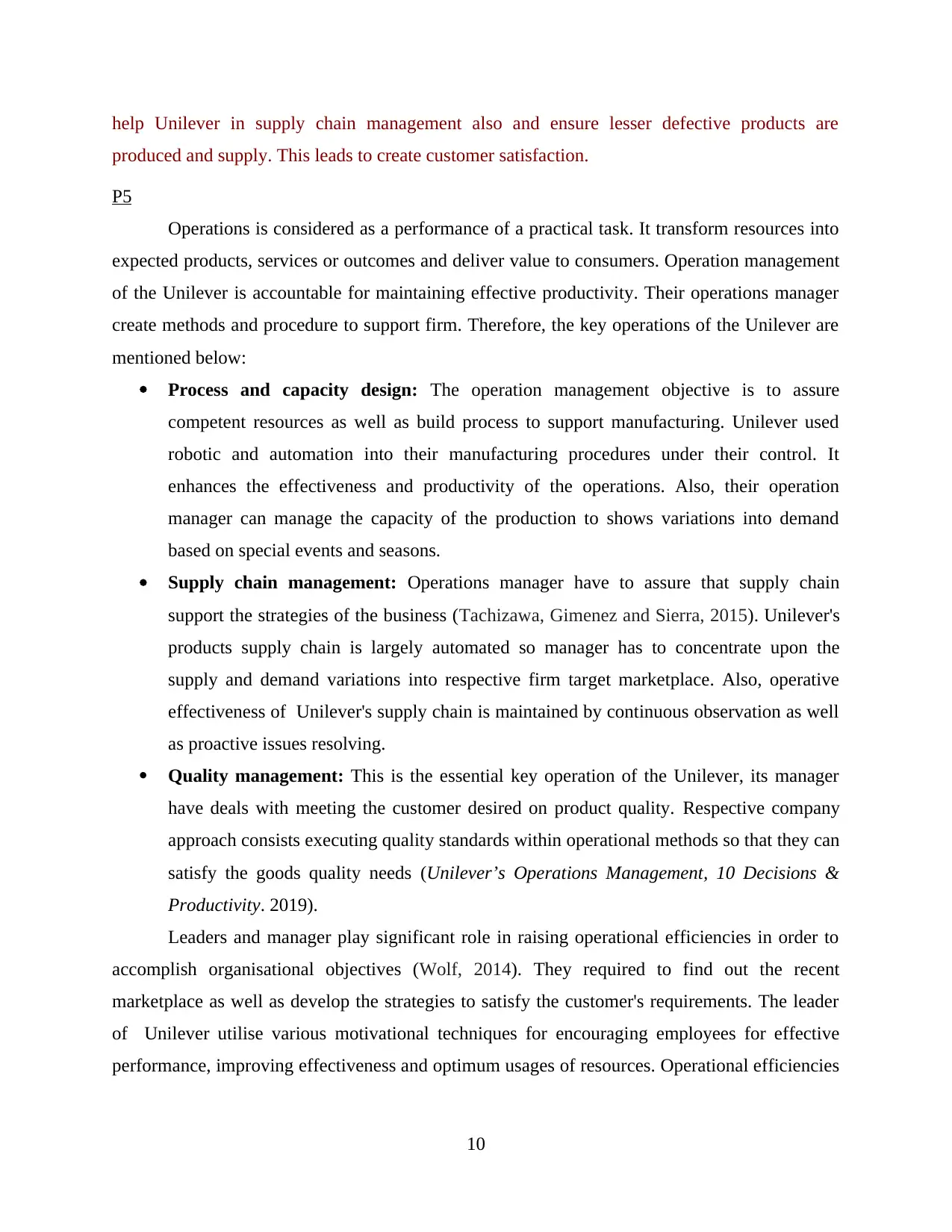
help Unilever in supply chain management also and ensure lesser defective products are
produced and supply. This leads to create customer satisfaction.
P5
Operations is considered as a performance of a practical task. It transform resources into
expected products, services or outcomes and deliver value to consumers. Operation management
of the Unilever is accountable for maintaining effective productivity. Their operations manager
create methods and procedure to support firm. Therefore, the key operations of the Unilever are
mentioned below:
Process and capacity design: The operation management objective is to assure
competent resources as well as build process to support manufacturing. Unilever used
robotic and automation into their manufacturing procedures under their control. It
enhances the effectiveness and productivity of the operations. Also, their operation
manager can manage the capacity of the production to shows variations into demand
based on special events and seasons.
Supply chain management: Operations manager have to assure that supply chain
support the strategies of the business (Tachizawa, Gimenez and Sierra, 2015). Unilever's
products supply chain is largely automated so manager has to concentrate upon the
supply and demand variations into respective firm target marketplace. Also, operative
effectiveness of Unilever's supply chain is maintained by continuous observation as well
as proactive issues resolving.
Quality management: This is the essential key operation of the Unilever, its manager
have deals with meeting the customer desired on product quality. Respective company
approach consists executing quality standards within operational methods so that they can
satisfy the goods quality needs (Unilever’s Operations Management, 10 Decisions &
Productivity. 2019).
Leaders and manager play significant role in raising operational efficiencies in order to
accomplish organisational objectives (Wolf, 2014). They required to find out the recent
marketplace as well as develop the strategies to satisfy the customer's requirements. The leader
of Unilever utilise various motivational techniques for encouraging employees for effective
performance, improving effectiveness and optimum usages of resources. Operational efficiencies
10
produced and supply. This leads to create customer satisfaction.
P5
Operations is considered as a performance of a practical task. It transform resources into
expected products, services or outcomes and deliver value to consumers. Operation management
of the Unilever is accountable for maintaining effective productivity. Their operations manager
create methods and procedure to support firm. Therefore, the key operations of the Unilever are
mentioned below:
Process and capacity design: The operation management objective is to assure
competent resources as well as build process to support manufacturing. Unilever used
robotic and automation into their manufacturing procedures under their control. It
enhances the effectiveness and productivity of the operations. Also, their operation
manager can manage the capacity of the production to shows variations into demand
based on special events and seasons.
Supply chain management: Operations manager have to assure that supply chain
support the strategies of the business (Tachizawa, Gimenez and Sierra, 2015). Unilever's
products supply chain is largely automated so manager has to concentrate upon the
supply and demand variations into respective firm target marketplace. Also, operative
effectiveness of Unilever's supply chain is maintained by continuous observation as well
as proactive issues resolving.
Quality management: This is the essential key operation of the Unilever, its manager
have deals with meeting the customer desired on product quality. Respective company
approach consists executing quality standards within operational methods so that they can
satisfy the goods quality needs (Unilever’s Operations Management, 10 Decisions &
Productivity. 2019).
Leaders and manager play significant role in raising operational efficiencies in order to
accomplish organisational objectives (Wolf, 2014). They required to find out the recent
marketplace as well as develop the strategies to satisfy the customer's requirements. The leader
of Unilever utilise various motivational techniques for encouraging employees for effective
performance, improving effectiveness and optimum usages of resources. Operational efficiencies
10
⊘ This is a preview!⊘
Do you want full access?
Subscribe today to unlock all pages.

Trusted by 1+ million students worldwide
1 out of 17
Related Documents
Your All-in-One AI-Powered Toolkit for Academic Success.
+13062052269
info@desklib.com
Available 24*7 on WhatsApp / Email
![[object Object]](/_next/static/media/star-bottom.7253800d.svg)
Unlock your academic potential
Copyright © 2020–2026 A2Z Services. All Rights Reserved. Developed and managed by ZUCOL.




